When I was thirteen, I created an MP3 player that ran on the International Space Station. I was part of my school’s code club (in fact, I was the only member!) and I remember my teacher coming up to me and asking if I’d be interested in a competition he had come across. At the time I wasn’t an experienced programmer. I’d only briefly heard of Python and I’d certainly never been able to use a Raspberry Pi before. But I said yes because it sounded like a fun project and, with the free box of equipment which included a Raspberry Pi and a SenseHAT, I was able to start turning my ideas into reality.
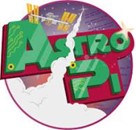
This was the Astro Pi competition and it involved writing code to either make the Raspberry Pi operate as an MP3 player, or create some music that the player would use. Code needed to be written in Python and this was the first big challenge. Armed with a beginner’s programming book, I spent hours over the Easter holidays putting together my project and sent it off extremely proud.
I couldn’t believe it when the winners were announced and seeing that I had won the top prize in my age category! In a video from the ISS, Tim demonstrated the MP3 player working with music composed by another winner and even wrote a message on the AstroPi blog saying that he had tried out the gyroscope function on the Sense HAT and that it had worked perfectly!
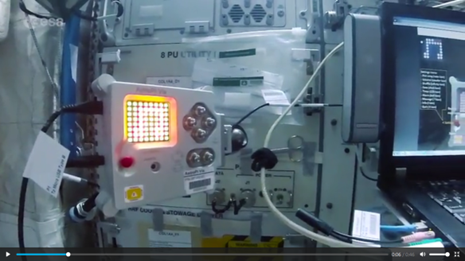
I still find it hard to believe that something I had made from my bedroom could be all the way on the International Space Station being controlled by a real-life astronaut. Space had always seemed so distant. It was something belonging primarily in silver screen sci-fi films and in lyrics to David Bowie songs and yet, in that moment, it couldn't have felt closer.
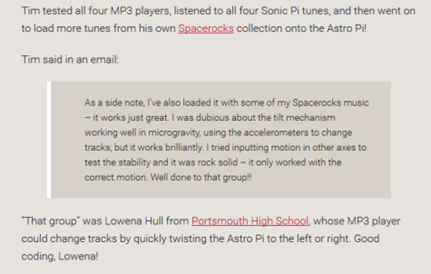
What can space provide?
Later that year I presented my work at the Principia Conference in Portsmouth and was lucky enough to meet and chat briefly with Tim Peake afterwards, which was very exciting.
In later years, the Astro Pi competition has evolved to become more open-ended. Now, students from across Europe can submit a hypothesis they want to test using data which can be collected from the Space Station. Teams write a program to collect this data, then analyse what gets sent back and submit a report. I entered Astro Pi once again a couple of years later with a project to measure chlorophyll concentrations in the ocean using the Raspberry Pi NoIR camera and how it correlates with the ocean temperatures.
It was here, again, that I was inspired. Now, the focus had shifted from space to more what space could provide. What could I see from space? What data could I get and what could it tell me? Space offered so many ideas and opportunities for learning. That’s the beauty of these competitions, I think. I could go on about the benefits of project-based learning, or the importance of developing programming skills in this rapidly progressing era we’re living through, but I what I love about the competitions I’ve entered is they bring space closer. They make space real. They introduce and inspire.

Winning the Astro Pi competition really launched my amazing journey through tech. I started participating in hackathons, speaking at events, entering and winning other competitions that enabled me to travel and speak at events such as the World AI Conference in Amsterdam in front of 6000+ industry delegates and travelling to San Francisco to run a hackathon and teach girls programming at the Mastercard building.
I also started helping out at my local Raspberry Jam, running workshops and presenting projects I’ve worked on throughout the year. I like helping
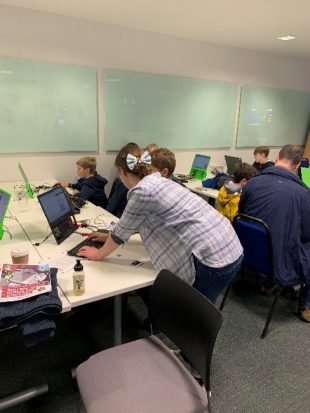
kids learn about AstroPi and enter the Mission Space Lab Challenge. Like me, I don’t think they truly believe that the code they’ve written in the workshop, the one that scrolls the message “Hello from Earth!” or “Look at the stars!” and their name, would run 400 kilometres above them. It’s so rewarding as a mentor to see their excitement and I can’t say I don’t wholeheartedly agree!
SatelLife and Trolley Tracker
More recently, I was thrilled to win the top individual prize in the SatelLife competition run by the UK Space Agency with my “Trolley Tracker” project. My project proposal used satellite data to allow tracking of supermarket trolleys via geo-fencing.
I first started thinking about my idea while in town one day when I spotted an abandoned shopping trolley. I didn’t think much of it at the time; for most people they generally fly pretty below the radar. It was only after I started see more of them and really started paying attention to them that I began to notice just how many there were. Research showed that abandoned shopping trolleys were a huge financial and environmental issue, so I knew I had found my problem.
I worked on my idea using equipment I already had to build a prototype which I was able to test by walking around my local area. I was able to receive signals from multiple satellites in order to plot my GPS coordinates and download them to my computer. I wrote up a report and submitted it to the competition.
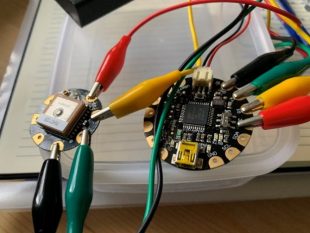
After winning the event, I was interviewed by BBC Breakfast and on various local and national radio shows. I was also contacted by a company interested in finding out more about my idea and a local organisation that had been dealing with the issue of dumped trolleys.
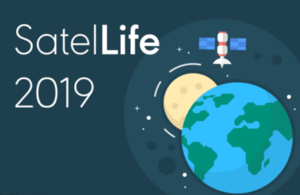
I was able to present my idea at a Dragon’s Den event at Harwell, in front of industry experts, which was intimidating but a fantastic opportunity. There were many other great ideas being showcased and it was great to meet all the other winners. From there, I was involved in lots of promotional work with the UK Space Agency team even up to a year later.
After attending the Space 2 Connect conference in London earlier this year, I met up with members of the UK Space Agency again and, with very little warning, I ended up being interviewed on BBC 5 live and on the evening news with Emily Gravestock, the Head of Applications Strategy!
Inspired by Tim
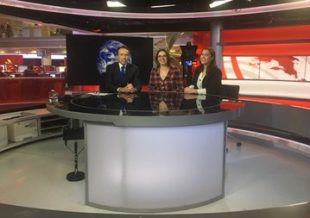
Many other doors have opened since I entered the AstroPi competition for the first time. I cannot overstate just how important that one, first step was to me. Without it, I don’t know if I would be on the path I’m on today. I have had the chance to do some amazing things, meet some incredible people and am now committed to inspiring others, particularly girls to get involved with STEM.
Having the opportunity to meet Tim Peake, who has been an inspiring ambassador and role model for children across the UK has also been an important part of my journey. I am now studying Natural Sciences and hope to combine my interests in STEM generally with the experience I have had in coding and tech for my future career. The space sector offers exciting opportunities for the future and I would love to be a part of that!

Go to www.gov.uk/InspiredByTim to submit your entry on how Tim’s mission, Principia, inspired you. The lucky winner will have chance to speak to Tim Peake! - get your entries in before 31 January.
Leave a comment